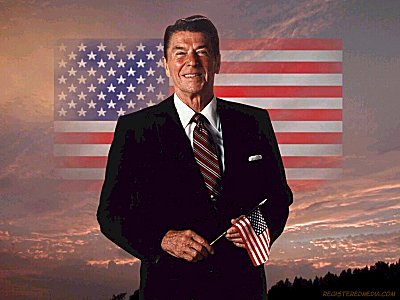US: Reagan Revealed – by Deroy Murdock
 Dr. Martin Anderson works in an ivory tower — literally. From high above Stanford University’s Hoover Institution, Anderson contemplates Ronald Reagan’s legacy as his centennial arrives on February 6.
Dr. Martin Anderson works in an ivory tower — literally. From high above Stanford University’s Hoover Institution, Anderson contemplates Ronald Reagan’s legacy as his centennial arrives on February 6.
Asked if he thinks Reagan’s stature has risen since he left office in 1989, Anderson says, “I don’t just think so. I know so.”
Reagan’s reputation has grown, largely thanks to the scholarship of Anderson and his wife, Annelise, both former Reagan aides and Hoover colleagues of mine. Like prospectors panning for flakes of gold, they routinely sift through boxes and boxes of Reagan’s papers. Their findings have surprised even the most stalwart Reaganites.
America’s 40th president succeeded, in part, by not challenging the widespread belief that he was a committed conservative who mainly sold free-market reforms while others fretted over their details and implementation. Reagan’s critics considered him gregarious, perhaps, but ultimately a mere actor who read whatever lines he was handed by such advisers as former White House counselor Ed Meese and the late media man Mike Deaver. The equally late Democratic eminence Clark Clifford famously dismissed Reagan as “an amiable dunce.”
The Andersons’ book, Reagan, In His Own Hand, detonated this myth. They discovered 670 scripts for commentaries that the former California governor aired on 236 radio stations from 1975 to 1979. Reagan offered his specific prescriptions on taxes, regulation, peace through strength, and even oceanic mineral content as it concerned the Law of the Sea Treaty. These scripts consisted of sheets of yellow legal paper brimming with Reagan’s own cursive handwriting.
Rather than a mere mouthpiece for his staff, Reagan himself researched and addressed topical issues with philosophical consistency and concrete evidence to bolster his opinions.
“In 1969 we virtually doubled the capital gains tax,” Reagan wrote in 1978. “In 1970 there were 31 mil[lion] investors putting up the capital to increase production & create jobs. Today there are fewer than 25 mil.”
The Andersons cross-tabulate, highlight, color-code, and digitize copies of Reagan’s documents, both from Hoover’s archives and the Reagan Library in Simi Valley, California. Reagan’s prolific pen still keeps them busy.
“We published about a thousand of his letters in Reagan: A Life in Letters,” Martin Anderson says. “There are about 10,000 Reagan letters. We’re still finding more.”
The Pentagon declassified additional papers that helped the Andersons explain how Reagan won the Cold War while firing barely a shot. Here again, Anderson says Reagan pursued precisely the policy that he wanted. His deputies worked hard to follow him — not the reverse.
Reagan was driven, Anderson believes, by something he learned at a Dec. 3, 1981, National Security Council meeting. “Right now in a nuclear war we’d lose 150 mil. people,” Reagan wrote in his diary. “The Soviets could hold their loss down to less than were killed in W.W. II” — some 25 million.
In short, 40 percent of America’s population would bury the other 60 percent before returning to the radioactive rubble. Reagan wanted to do better.
“He was the only person who was smart enough to know what to do,” Anderson says. “And he did it.”
Thus, Reagan launched a tax-cut-fueled economic expansion and an aggressive military buildup, including missile-defense research. After seven exhausting decades of “scientific socialism,” the USSR could not keep up.
Reagan also engaged Russia in high-stakes diplomacy, which finally succeeded after Soviet leader Mikhail Gorbachev concluded that resistance was futile and accepted deep arms reductions.
When, exactly, did Reagan win the Cold War? Anderson cites the June 1, 1988 completion of Reagan and Gorbachev’s Moscow summit. They jointly declared “their solemn conviction that a nuclear war cannot be won and must never be fought#…#and their disavowal of any intention to achieve military superiority.”
This reflected Reagan’s singular desire to end Mutual Assured Destruction. Like most of his other policies, this sprang from his well-honed intellect and his deep-seated faith in America’s abilities. He governed with focused self-confidence. As Reagan told his very first National Security Council meeting on Feb. 6, 1981: “I will make the decisions.”
“People used to say, ‘Reagan was a nice guy. But who was handling all of this stuff for him?’” Martin Anderson marvels. “We didn’t know. And now we do: He was.”
— Deroy Murdock is a nationally syndicated columnist with the Scripps Howard News Service and a media fellow with the Hoover Institution on War, Revolution and Peace at Stanford University.
Source: National Review
No comments:
Post a Comment